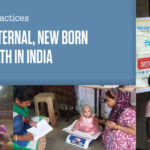
Yukti Yojana – A Public Private Partnership for Expanding Availability of Safe Abortion Services in Bihar, featured in the compendium of successful projects in the field of Maternal, Newborn and Child Health that was launched in a conference ‘Sharing of Best Practices: Improving Maternal, New Born and Child Health in India’. The conference was jointly organised by FICCI Aditya Birla CSR Centre of Excellence and Glenmark Pharmaceuticals’ CSR arm Glenmark Foundation on March 28, 2018 in New Delhi.
For women in India, access to abortion has been marred by extreme stigma, lack of awareness about its legality, unavailability of safe services near the community, and high costs charged by providers. Unsafe abortion practices were the third largest contributor of maternal deaths in India. However, over the last decade, women who cannot access safe and legal services have moved to self-use of medical abortion (abortion with pills) — perhaps a better option than resorting to life-threatening means.
The shortage of trained providers and lack of facilities offering safe abortion services are two of the key contributors to unsafe abortion in India. Unfortunately, the one policy action that could address this acute public health crisis is yet to be taken – making the necessary legal and policy changes to permit nurses and non-allopathic doctors to offer early abortion services, after suitable training.
While the courts deliver pro-women judgements around abortions, parliament has delayed passing much-needed amendments to the MTP Act.
The pregnancy of a 10-year-old presents a complex and unprecedented situation but laws sensitive to the needs of the women and girls involved could make a world of a difference.
This paper reports the results of an intervention with 3,471 abortion providers in India, Nepal and Nigeria. Following abortion care training, providers received in-person visits and virtual contacts by a clinical and programmatic support team for a 12-month period. The intervention also included technical assistance to and upgrades in facilities where the providers worked.
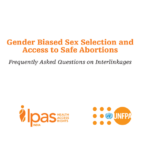
This is an advocacy tool for implementing authorities, service providers and NGOs on safe abortion and sex selection.
This study aimed to compare the effectiveness of a high-intensity model (HIM) and a low-intensity model (LIM) of behaviour change communication interventions in Bihar and Jharkhand states of India designed to improve women’s knowledge and usage of safe abortion services. Although both intervention types improved abortion knowledge, the HIM intervention was more effective.
This study looked at the socio-economic profile of women seeking abortion services in public health facilities across Madhya Pradesh state and at out of pocket cost accessing abortion services. In particular, it examined the level of access that poor women have to safe abortion services in Madhya Pradesh. Findings highlight that, overall, 57% of women who received abortion care at public health facilities were poor, followed by 21% moderate and 22% rich. Improved availability of safe abortion services at the primary level in Madhya Pradesh has helped meeting the need of safe abortion services among poor, which eventually will help reducing the maternal mortality and morbidity due to unsafe abortion.
Women receiving induced abortions or postabortion care are at high risk of subsequent unintended pregnancy, and intervals of less than six months between abortion and subsequent pregnancy may be associated with adverse outcomes. This study highlights the prevalence and attributes of postabortion contraceptive acceptance from 2,456 health facilities in six major Indian states, among 292,508 women who received abortion care services from July 2011 through June 2014.
Contraception is an essential element of high-quality abortion care. However, women seeking abortion often leave health facilities without receiving contraceptive counselling or methods, increasing their risk of unintended pregnancy. This paper describes contraceptive uptake in 319,385 women seeking abortion in 2,326 public-sector health facilities in eight African and Asian countries. Ministries of Health integrated contraceptive and abortion services, with technical assistance from Ipas. Overall, postabortion contraceptive uptake was 73 percent. The findings demonstrate high contraceptive uptake when it is delivered at the time of the abortion, a wide range of contraceptive commodities is available, and ongoing monitoring of services occurs.
This study aimed to understand women’s pathways of seeking care for postabortion complications in Madhya Pradesh, India. The study recruited 786 women between July and November 2007.
Despite the adoption of the Medical Termination of Pregnancy Act in 1972, access to safe abortion services remains limited in India. Awareness of the legality of abortion also remains low, leading many women to seek services outside the health system.
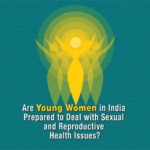
Young Indian women often face social, economic, logistical, policy and health system barriers when accessing sexual and reproductive health services, including safe abortion care. A cross-sectional household survey was conducted in July – August 2012 in Jharkhand, India. We interviewed 1,381 young women (15-24 years) to assess their knowledge, agency, and skills on SRH issues, including safe abortion, and to identify barriers and influencers that lead to particular behaviors, decisions, or service utilization.
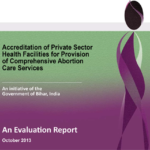
Recognizing the need to increase access to safe abortion services to reduce maternal mortality and morbidity, in 2011 the Government of Bihar developed a new mechanism of accrediting and subsidizing private health care facilities. The program, Yukti Yojana (“a scheme for solution”), accredits eligible health facilities and supports them in providing abortion-related services free of charge to low-income women. This is the first PPP model in India to ensure access to safe abortion services free of cost at accredited private facilities. This study evaluates the efficacy of the first phase of intervention for scaling up further and replicating the same model in other states.
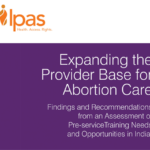
In 2012, Ipas undertook an assessment in Bangladesh, India, Nepal and Pakistan to determine the specific needs and gaps in the pre-service education systems for midlevel providers and to identify opportunities, strategies and recommendations for creating more equitable access to safe abortion care. Sources for the pre-service assessment include curricular review; government documents; key informant interviews; reports; assessments of provider performance and training; and site observation visits. The assessment results and recommendations in this report focus on Bangladesh.

